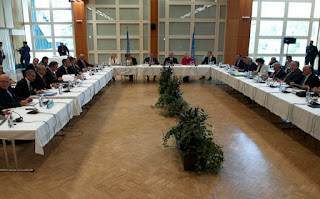A Time for Realism
Sitting in Athens, one’s perspective, regarding developments in Greece’s wider neighbourhood, is obviously different from that of many other allied capitals. Here one has the impression, as it is cultivated by the mass media especially in its electronic form and many of the country’s elite, that uncontrollable, irreversible processes have taken hold and that the world as we know it is steadily being reshaped and recalibrated. An unusually high and troubling recent rate of seismic activity does certainly not help alleviate a general feeling of malaise.
What seems to be troubling public opinion? Kosovo has unilaterally declared independence with the blessing of most great and not so great powers of the West, the Former Yugoslav Republic of Macedonia (FYROM) wants to become a NATO member preferably without compromising in its name dispute with Greece, Turkey is simultaneously beset by two existentialist crises – the head scarf issue and the Kurdish conundrum, and Cyprus has a new President – the EU’s only sitting Communist leader – thereby effectively relaunching the UN’s efforts to bring the country’s division to an end.
As a result, the mainstream reaction inside the region’s most stable and oldest EU member state is atavistic and not befitting Greece’s international standing and its constructive influence in the region as one of its biggest investors and a steadfast proponent of the continued europeanisation of South Eastern Europe and Turkey. While Greece’s current government and the country’s main opposition have acted responsibly to date in trying to cope constructively with the aforementioned developments, their room for maneuver is severely hampered. When on a daily basis the influential main television channels bombard the public with alarmist analysis of doubtful credibility regarding the stakes in the region, Greece’s belonging in the postmodern world of the European Union is threatened by premodern sentiments giving rise to nationalism, irrational theories, and a perverted sense of history.
The promotion and defense of a country’s national interests is a process that cannot be held sway to the emotions of the day and the rhetoric of firebrands which unfortunately abound. More realism and clear headedness is needed by all of the country’s institutional elite – and its fourth estate in particular which should not forget its role as a responsible watchdog. The same applies to all of the country’s political forces, especially those with parliamentary representation and the church which should remember that the separation between church and the affairs of the state has not been abolished (as some of its more influential clergy seem to think).
The plethora of developments in Greece’s wider neighbourhood should be seen as an opportunity for constructive engagement rather than the manifestation of helplessness and revindication of lost causes due to overt great power influence. This is the time for realism not hyperbole.
What seems to be troubling public opinion? Kosovo has unilaterally declared independence with the blessing of most great and not so great powers of the West, the Former Yugoslav Republic of Macedonia (FYROM) wants to become a NATO member preferably without compromising in its name dispute with Greece, Turkey is simultaneously beset by two existentialist crises – the head scarf issue and the Kurdish conundrum, and Cyprus has a new President – the EU’s only sitting Communist leader – thereby effectively relaunching the UN’s efforts to bring the country’s division to an end.
As a result, the mainstream reaction inside the region’s most stable and oldest EU member state is atavistic and not befitting Greece’s international standing and its constructive influence in the region as one of its biggest investors and a steadfast proponent of the continued europeanisation of South Eastern Europe and Turkey. While Greece’s current government and the country’s main opposition have acted responsibly to date in trying to cope constructively with the aforementioned developments, their room for maneuver is severely hampered. When on a daily basis the influential main television channels bombard the public with alarmist analysis of doubtful credibility regarding the stakes in the region, Greece’s belonging in the postmodern world of the European Union is threatened by premodern sentiments giving rise to nationalism, irrational theories, and a perverted sense of history.
The promotion and defense of a country’s national interests is a process that cannot be held sway to the emotions of the day and the rhetoric of firebrands which unfortunately abound. More realism and clear headedness is needed by all of the country’s institutional elite – and its fourth estate in particular which should not forget its role as a responsible watchdog. The same applies to all of the country’s political forces, especially those with parliamentary representation and the church which should remember that the separation between church and the affairs of the state has not been abolished (as some of its more influential clergy seem to think).
The plethora of developments in Greece’s wider neighbourhood should be seen as an opportunity for constructive engagement rather than the manifestation of helplessness and revindication of lost causes due to overt great power influence. This is the time for realism not hyperbole.


Comments